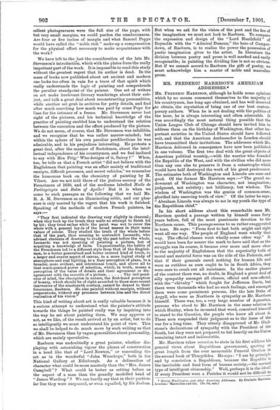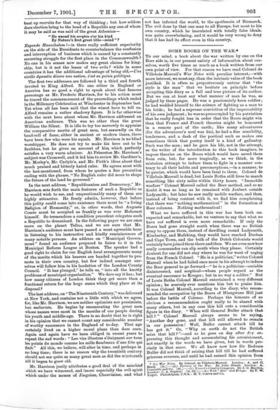MR. FREDERIC HARRISON'S AMERICAN ADDRESSES.*
FREDERIC HARRISON, although he holds some opinions
which by no means commend themselves to the majority of his countrymen, has long ago obtained, and has well deserved to obtain, the reputation of being one of our best contem- porary authors. When he is not dealing with the politics of the hour, he is always interesting and often admirable. It was accordingly the most natural thing possible that the Union League Club of Chicago should have invited him to address them on the birthday of Washington, that other im-
portant societies in the United States should have followed suit, and that the American Ambassador in London should have transmitted their invitations. The addresses which Mr. Harrison delivered in consequence have now been published in one volume. The first two deal with the great objects of American political worship,—with the warrior who founded the Republic of the West, and with the civilian who did more than any one else to preserve it from a catastrophe which would have half destroyed the work of his great predecessor. The estimates both of Washington and Lincoln are sane and good. Of the former Mr. Harrison says :—" The grand en- dowment of Washington was character, not imagination; judgment, not subtlety; not brilliancy, but wisdom. The wisdom of Washington was the genius of common-sense, glorified into unerring truth of view." Of the latter he says: "Abraham Lincoln was always to me in my youth the type of the Republican chief."
In his short address about this remarkable man Mr. Harrison quoted a passage written by himself some forty years before, full of the most passionate devotion to the Northern cause. This passage seems to Us rather exaggerated in tone. He says: " From first to last both might and right went all one way. The people of England went wholly that way. The official classes went wholly some other way." It would have been far nearer the mark to have said that as the struggle ran its course, it became ever more and more clear to the majority of Englishmen that the superiority both of moral and material force was on the aide of the Federals, and that if their generals cared nothing for human life and were as ruthless as ours ought to be in South Africa, they were sure to crush out all resistance. In the earlier phases of the contest there was, no doubt, in England a great deal of silly sympathy amongst all classes, official and non-official, with the " chivalry " which fought for Jefferson Davis, but there were thousands who had no such feelings, and amongst them were some prominent persons, like the late Duke of Argyll, who were as Northern in sympathy as Mr. Harrison himself. There was, too, a very large number of Agnostics, persons who stood to Mr. Harrison in the same relation in which Huxley, when he invented that word, conceived himself to stand to the Gnostics, the people who knew all about it. These men suspended their judgment as to the issue of the war for a long time. They utterly disapproved of Mr. Glad- stone's declarations of sympathy with the President of the South, but they were not prepared to bet heavily on the Union remaining intact and indissoluble.
Mr. Harrison takes occasion to state in his first address his general views about Republican government, quoting at great length from the ever memorable Funeral Oration in
the second book of Thucydides. He says : "I am by principle and by conviction a Republican, because the Republic is the inevitable and final form of human society,—the normal type of intelligent citizenship." Well, perhaps it is the ideal! If every President were a Pericles it would not be difficult to * George Washington, and other American Addresses. By Frederic Harriron. London : Macmillan and Co. Pie. 6d. notel beat up recruits for that way of thinking ; but how seldom does election bring to the head of a Republic any one of whom it may be said as was said of the great Athenian—
"He waved his sceptre o'er his kind By Nature's first great title—mind"?
Expends Hannibalem !—is there really sufficient superiority .on the side of the Presidents to counterbalance the confusion and interruption of business which is caused by a constantly recurring struggle for the first place in the Commonwealth? No one in his senses now makes any great claims for king- ship, but is it not the lesser of two evils ? while in some countries it has the additional advantage of being old,—Une visille dynastie di core tine nation, em sa !Joggle politique.
The first two addresses are followed by a third and fourth devoted to King Alfred. No one either in England or America has so good a right to speak about that famous personage as Mr. Frederic Harrison, for to his action must be traced the commencement of the proceedings which ended in the Millenary Celebration at Winchester in September last. Yet when all has been said that the wisest have to tell us, Alfred remains a rather shadowy figure. It is far otherwise with the next hero about whom Mr. Harrison addressed an American audience. This was no other than the great William the Silent. It is idle to try too narrowly to appraise the comparative merits of great men, but assuredly on the bead-roll of fame, either in ancient or modern times, there have been few who were his equals. Mr. Harrison is no blind worshipper. He does not try to make his hero out to be faultless, but he gives an account of him which perfectly satisfies a very warm admirer. At Princeton Mr. Harrison's subject was Cromwell, and it led him to review Mr. Gardiner's, Mr. Morley's, Mr. Carlyle's, and Mr. Firth's ideas about that much praised and bitterly hated ruler. He agrees most with the Last-mentioned, from whom he quotes a fine peroration ending with the phrase, "No English ruler did more to shape the future of the land he governed."
In the next address, "Republicanism and Democracy," Mr. Harrison sets forth the main features of such a Republic as be would wish to see, and unquestionably many of them are highly attractive. He freely admits, however, that before this polity could come into existence there must be "a living Religion of Humanity," or, in other words, that Auguste Comte must be accepted as frankly as was ever Mahomet himself. So tremendous a condition precedent relegates such a Republic to dreamland. In the following paper we are once more on the planet Tellus, and we are sure that Mr. Harrison's audience must have passed a most agreeable hour in listening to his instructive and kindly reminiscences of many notable persons. An address on "Municipal Govern. ment" found an audience prepared to listen to it in the Municipal Reform League at Boston. The speaker had a good right to claim for our English local arrangements many of the merits which his hearers are banded together to pro- mote in their own country, but few indeed amongst our- selves will follow him in his laudation of the London County Council. "It has plunged," he tells us, "into all the knotty problems of municipal organisation." We dare say it has; but how many citizens of London think they get more than a fractional return for the huge sums which they place at its disposal?
The last address, on" The Nineteenth Century," was delivered at New York, and contains not a little with which we agree, for, like Mr. Harrison, we are neither optimists nor pessimists, but me2iorists. He begins by enumerating the great men whose names were most in the mouths of our people during his youth and middle-age. There is no doubt that he is right in his opinion that we cannot count any considerable number of worthy successors in the England of to-day. That age certainly lived on a higher moral plane than does ours. Again and again have we been obliged in recent years to repeat the sad words : "Les vies illustres s'eteignent sur thus les points du monde comme les mile flambeaux d'une fete qui finit." All this, we believe, will alter in time, and perhaps in no long time; there is no reason why the twentieth century should not see quite as many great men as did the nineteenth till it began to grow old.
Mr. Harrison justly attributes a good deal of the mischief which we have witnessed, and more especially the evil spirit which under the names of Jingoism, Chauvinism, and what not has infected the world, to the apotheosis of Bismarck. The evil done by that one man to all Europe, but most to his own country, which he inoculated with totally false ideals, was quite overwhelming, and it would be very wrong to deny that it has had its effect even in this country.































































 Previous page
Previous page